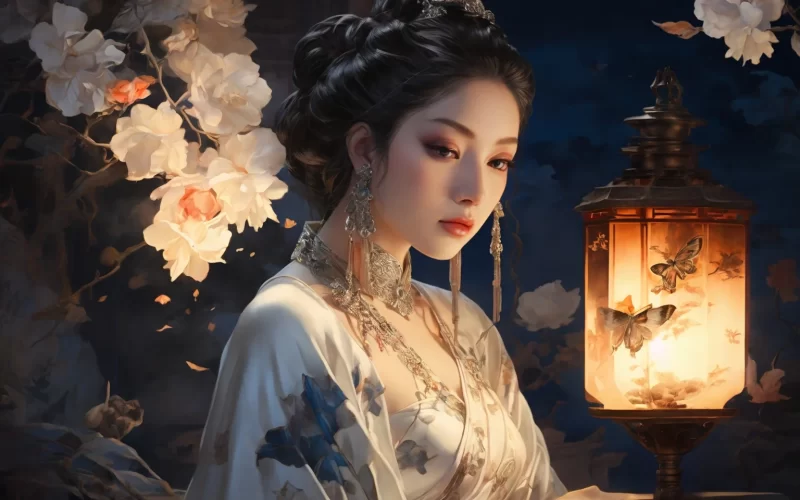When the moonlight, reaching a tree by the gate, Shows her a quiet bird on its nest, She removes her jade hairpins and sits in the shadow And puts out a flame where a moth was flying.
Original Poem:
「赠内人」
禁门宫树月痕过,媚眼惟看宿鹭窠。
斜拔玉钗灯影畔,剔开红焰救飞蛾。
Interpretation:
This is a poem about the grievances of the palace, but the poet Zhang Hu is unique and does not fall into the mould, neither describing their bleak and lonely lives nor directly telling their sorrowful grievances, but only reflecting her encounter, situation and mood from the two subtle movements of one of them under the moon and by the lamp.
Pity this beautiful girl, with bright eyes, but can not see the world outside the forbidden door. At this moment, under the moonlight, she is looking at the nest of the heron, not only looking, but also "only looking". This is because there is nothing to see in the monotonous environment of the prison, so she has no choice but to look at the heron nest high up in the palace trees; or perhaps because, although there are many things to see around her, the heron nest at the top of the tree is the only one that attracts her attention because it is full of life. Here, the poet does not further reveal her inner activity when she is "only looking at the heron nest", which is left to the reader's imagination. It may be assumed that, at this time, the moon is over the palace trees and the birds have already joined the forest, she will think when she gazes at the heron nest: the birds still have a home and a "family", they can still fly out of the forbidden gate and fly in the vast world, while she does not know when she can fly out of the cage and return to earth. A pair of charming eyes are full of longing for freedom and happiness.
The second half of the poem changes the scene from outdoors to indoors, from the treetops of the palace courtyard to the light of the interior, showing a close up scene of a moth being rescued by plucking a jade hairpin, a delicate brush stroke depicting an extremely beautiful female action of the poet, showing the beauty of the young girl. Here, the poet does not reveal her inner activities, but we can imagine that if she sees a bird returning to its nest, she will be sad that she is not as good as a bird, then when she sees a moth throwing itself into the fire, she will be sad that her fate is like that of a moth, and she will pick out the red flame to save the moth, both out of sympathy for the moth and out of self-pity.
This is a poem with a deep and intriguing meaning, which has its own distinctive features in terms of artistic conception and expression.

Zhang Hu
More ↗
Zhang Hu (张祜, 785-849 A.D.) was a poet from Qinghe in the Tang Dynasty, he wrote more than a thousand poems in total. In his early years, he lived in Gusu, but in the middle of Changqing, he was not recommended by Linghu Chu. He was rejected by Yuan Zhen, so he went to Huainan and lived in seclusion in Danyang Qu'a. During his life, Zhang Hu made remarkable achievements in poetry. Zhang Hu was named after his poem "Three thousand miles from his homeland, twenty years in the deep palace", and his 349 poems are included in The Complete Tang Poems.
Poem translator:
Kiang Kanghu












